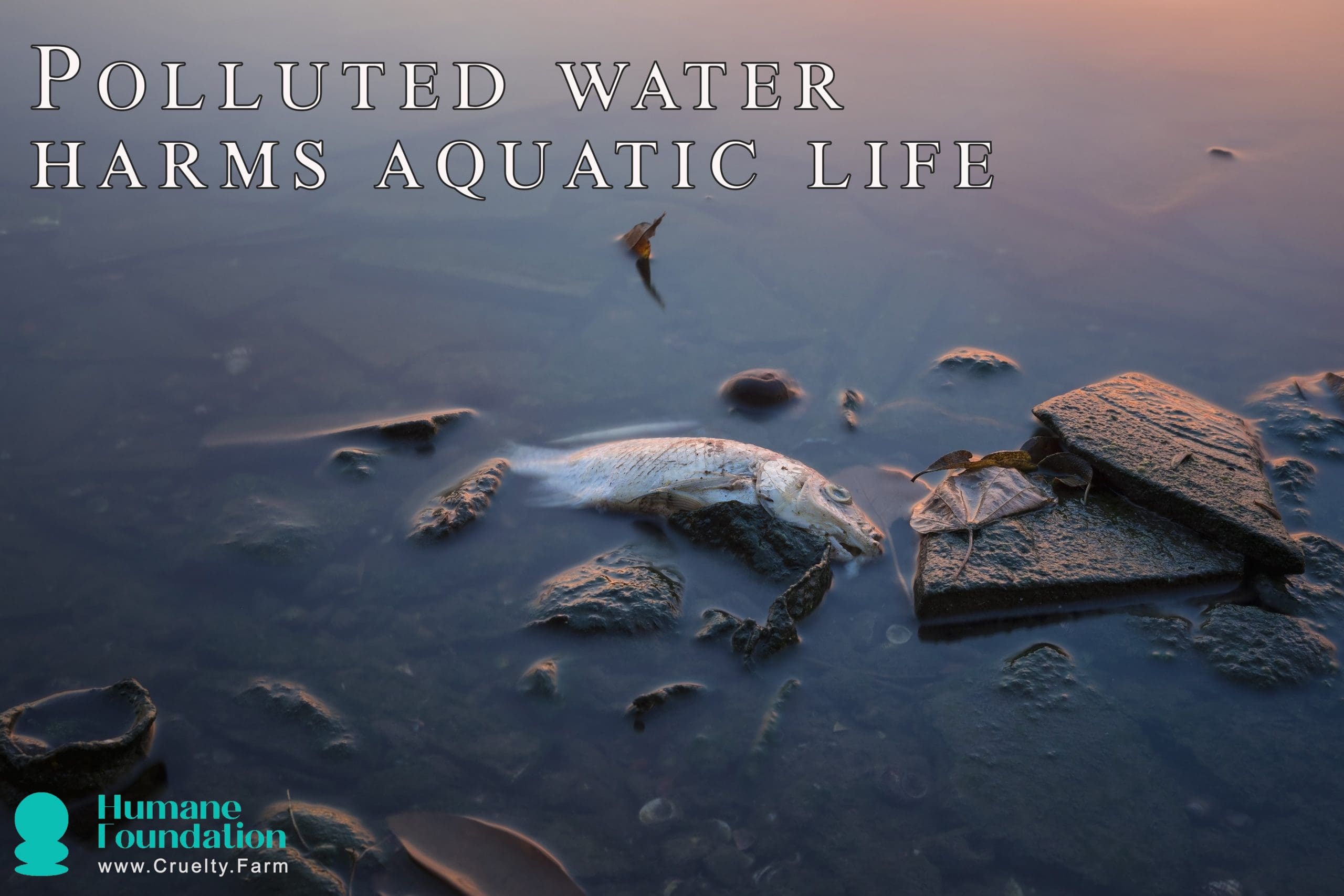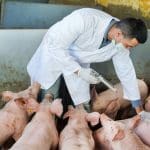Factory farming, also known as industrial agriculture, has become a dominant method of food production in many countries around the world. This method involves raising large numbers of livestock in confined spaces, with the primary goal of maximizing production and profits. While it may seem like an efficient way to feed a growing population, the negative impacts of factory farming on local ecosystems and the environment as a whole cannot be ignored. From pollution of water sources to destruction of natural habitats, the consequences of this industrialized form of agriculture are far-reaching and detrimental. In this article, we will delve deeper into the negative effects of factory farming on local ecosystems, and explore ways in which we can raise awareness about this pressing issue. By understanding the scope of the problem and taking action to address it, we can work towards creating a more sustainable and environmentally friendly food system for both present and future generations.
Damaged soil leads to erosion
Unhealthy or damaged soil is a significant contributor to erosion, posing a threat to local ecosystems. When soil is depleted of essential nutrients and organic matter, its ability to retain moisture and support vegetation diminishes. As a result, rainfall and irrigation water are more likely to wash away the topsoil, leading to erosion. This erosion not only reduces the fertility of the land but also disrupts the delicate balance of the surrounding ecosystems. Without a healthy soil structure, the natural processes that support plant growth and provide habitat for wildlife become compromised, further exacerbating the negative effects of factory farming on local ecosystems.
Polluted water harms aquatic life
The presence of polluted water has a detrimental impact on aquatic life within local ecosystems. Due to factors such as industrial runoff, agricultural pesticides, and improper waste disposal, the quality of water bodies can become compromised, leading to harmful consequences for the organisms that rely on them. High levels of pollutants, such as heavy metals and chemicals, can disrupt the delicate balance of aquatic ecosystems, affecting the health and survival of various species. Aquatic plants, fish, and other organisms can suffer from reduced oxygen levels, increased toxicity, and habitat degradation, leading to decreased biodiversity and potential population declines. It is crucial to understand and address the negative effects of polluted water on aquatic life in order to preserve the health and sustainability of local ecosystems.

Chemical runoff affects nearby crops
The proximity of factory farms to agricultural fields can result in the negative impact of chemical runoff on nearby crops. When excess fertilizers and pesticides used in factory farming operations are washed away by rainfall or irrigation, they can contaminate the surrounding soil and water sources. This runoff carries with it a plethora of harmful chemicals, including nitrogen and phosphorus compounds, herbicides, and antibiotics, which can seep into the ground and be absorbed by the root systems of nearby crops. As a result, these chemicals can not only affect the growth and development of the crops, but also find their way into the food chain, potentially posing risks to human health. It is imperative to raise awareness about this issue and explore sustainable farming practices to mitigate the adverse effects of chemical runoff on crop production and the overall health of local ecosystems.
Loss of biodiversity disrupts ecosystems
The loss of biodiversity poses a significant threat to ecosystems worldwide. Biodiversity, which refers to the variety of species and their genetic makeup within a given area, plays a crucial role in maintaining the delicate balance of ecosystems. Each species has a unique role and function, contributing to the overall stability and functionality of the ecosystem. When biodiversity is disrupted, either through habitat destruction, climate change, or human activities such as factory farming, it can have far-reaching consequences. The loss of key species can lead to a cascade effect, disrupting food chains, nutrient cycles, and ecological processes. This disruption can result in reduced ecosystem resilience and productivity, increased vulnerability to invasive species, and a decline in ecosystem services, such as pollination and natural pest control. Therefore, it is essential to raise awareness about the negative effects of activities like factory farming on local ecosystems to encourage sustainable practices and conservation efforts that protect biodiversity and preserve the health and functioning of our natural environments.
Overuse of antibiotics leads to resistance
The overuse of antibiotics has become a significant concern in the field of healthcare. Antibiotics are powerful medications that have revolutionized the treatment of bacterial infections, saving countless lives. However, the widespread and inappropriate use of antibiotics has resulted in a growing problem – antibiotic resistance. When antibiotics are used excessively or unnecessarily, bacteria can develop mechanisms to survive and become resistant to these drugs. This resistance can spread within populations of bacteria, making infections harder to treat and posing a serious threat to public health. It is crucial to educate the public and healthcare professionals about the importance of responsible antibiotic use to preserve the effectiveness of these life-saving medications and mitigate the risk of antibiotic resistance.
Animal waste contaminates surrounding areas
Animal agriculture is a significant contributor to environmental pollution, particularly in terms of animal waste contamination. The vast amounts of waste produced by factory farming operations pose a serious threat to surrounding areas. The runoff from these facilities, which contains high concentrations of nitrogen, phosphorus, and pathogens, can seep into nearby water sources, causing harmful algal blooms and compromising the health of aquatic ecosystems. Additionally, the noxious odors emitted from these operations can negatively impact the air quality of neighboring communities, leading to respiratory issues and a diminished quality of life for residents.

Unsustainable practices harm our environment
The detrimental impact of unsustainable practices on our environment cannot be overstated. From deforestation to excessive energy consumption, these practices not only deplete our precious natural resources but also contribute to the degradation of ecosystems worldwide. The relentless pursuit of short-term gains and profit often comes at a steep price, as we witness the loss of biodiversity, disruption of delicate ecological balance, and the release of harmful pollutants into the air, water, and soil. It is crucial that we recognize the urgent need for change and embrace sustainable alternatives to ensure the long-term well-being of our planet and all its inhabitants. By adopting environmentally conscious practices and promoting responsible stewardship, we can work towards a greener, cleaner, and healthier future for generations to come.
In conclusion, it is vital that we raise awareness about the negative effects of factory farming on local ecosystems. The unsustainable practices of factory farming not only harm animals, but also have detrimental impacts on the environment and the health of our communities. By educating ourselves and others, we can work towards promoting more sustainable and ethical farming practices that not only benefit our ecosystems, but also ensure the well-being of all living beings. Let us strive to make a positive impact on our world by advocating for change in the agricultural industry.
FAQ
How does factory farming contribute to the pollution of local ecosystems?
Factory farming contributes to the pollution of local ecosystems in several ways. Firstly, the large amounts of animal waste produced by factory farms contain high levels of nitrogen and phosphorus, which can runoff into nearby water bodies, causing water pollution and eutrophication. Secondly, the excessive use of antibiotics and growth hormones in factory farming can enter the environment through waste, leading to antibiotic resistance and disruption of ecosystems. Additionally, the disposal of dead animals and the emissions from concentrated animal feeding operations (CAFOs) release pollutants into the air, contributing to air pollution and climate change. Overall, factory farming practices have significant negative impacts on local ecosystems and their biodiversity.
What are some specific negative effects of factory farming on local water sources?
Factory farming has several negative effects on local water sources. The excessive use of fertilizers and pesticides in factory farming operations can lead to runoff, contaminating nearby streams, rivers, and groundwater. The large amounts of animal waste produced by confined animals can also contribute to water pollution through runoff and the leaching of harmful substances into water sources. Additionally, the high water consumption required by factory farms can lead to the depletion of local water supplies. These negative effects can harm aquatic ecosystems, compromise the quality of drinking water, and have long-term impacts on the sustainability of local water sources.
How does the use of antibiotics in factory farming impact the local ecosystem and biodiversity?
The use of antibiotics in factory farming can have negative impacts on the local ecosystem and biodiversity. Antibiotics can enter the environment through animal waste and runoff, leading to the development of antibiotic-resistant bacteria in soil and water. These resistant bacteria can then spread to other organisms, including wildlife and humans, posing a threat to public health. Additionally, antibiotics can disrupt the natural balance of microbial communities in the ecosystem, affecting the diversity and functioning of various organisms. This can lead to ecological imbalances and potential declines in biodiversity, with far-reaching consequences for the overall health and stability of the local ecosystem.
What are the consequences of factory farming on soil quality and its impact on local plant life?
Factory farming has significant consequences for soil quality and local plant life. Intensive farming practices, such as the use of chemical fertilizers and pesticides, result in soil degradation, loss of organic matter, and reduced soil fertility. This leads to decreased nutrient availability for plants and can negatively impact their growth and productivity. Additionally, factory farming often involves monoculture, which reduces biodiversity and can disrupt local ecosystems. The excessive use of water and land for factory farming also contributes to environmental degradation and can lead to the depletion of natural resources. Overall, factory farming has a detrimental impact on soil quality and local plant life, posing long-term risks to agricultural sustainability.
How does the disposal of waste from factory farms affect air quality and nearby wildlife populations?
The disposal of waste from factory farms can significantly impact air quality and nearby wildlife populations. The waste, which often contains high levels of pollutants and toxins, can release harmful gases such as ammonia, hydrogen sulfide, and methane into the air. These gases contribute to air pollution and can have detrimental effects on human health and the environment. Additionally, the disposal methods, such as spreading waste on fields or storing it in lagoons, can lead to contamination of nearby water sources, which further impacts wildlife populations. The runoff from these waste disposal practices can introduce excess nutrients into water bodies, causing algal blooms and oxygen depletion, leading to the death of aquatic organisms.















































